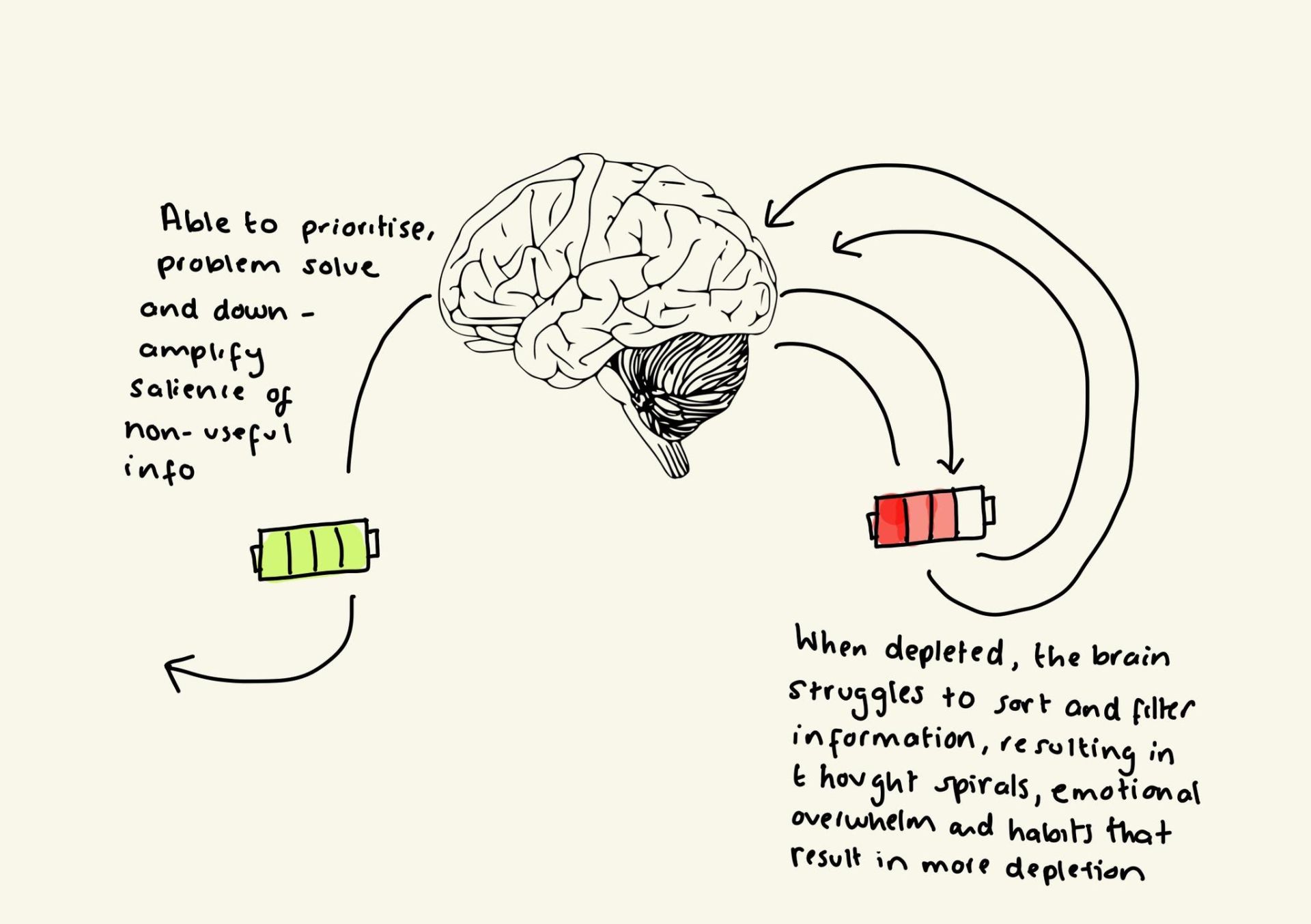Why Your Brain Won't Switch Off (And It's Not Just Because You're Busy)
Sep 18
/
Dr Sula Windgassen
Do you know that feeling when your mind is like a browser with 47 tabs open, each one demanding attention? You try reasoning with your brain, explaining why you don't need to think about that work project at 11pm or revisit that conversation from three weeks ago. But instead of quieting down, your mind just opens more tabs.
Most of us assume this mental chatter happens because we're simply too busy - our brains are "full up" with legitimate concerns. But research reveals something fascinating: when we're stressed, we instinctively reach for activities that promise relief but actually make the problem worse. That mindless scrolling, compulsive online shopping, or binge-watching shows we barely care about? They're not just harmless distractions - they're secretly draining our cognitive resources and keeping us stuck in cycles of mental fatigue.
Understanding why this happens - and what to do about it - could be the key to finally getting some proper headspace.
"My brain won't switch off"
Do you ever get that feeling where you just want to outrun your own head? It's constantly bombarding you with the things you have yet to do, things that might be worth considering, ways you might improve stuff you had thought was finished already… You may find yourself reasoning with your brain why it is actually ok and you made the right decision or why you don't have to think about this now, only to find yourself in a deadlock of more brain noise being generated; but what about …???
You probably have a ready point of reference for this and your reasoning for this happening is because there is too much on and filling your brain up. But what if I told you that this is only one of the reasons this happens and that actually, it could be a reason that is over-ridden?
Hear me out.
It stands to reason when there are lots of stressors, there are lots of stimuli your brain is calculating, with lots of internal biological reactions that amplify the salience of these stimuli and more. This 'fills your brain up' so-to-speak, so you feel there is no room for more thoughts and yet they keep coming. Often in an attempt to get some headspace, we reach (automatically and unconsciously) for things that help us essentially numb out. Watching hours of shows we only vaguely care about the plot in. Or compulsively online shopping only to empty the basket at the end. Spending hours exercising or doing chores or planning out to the finest details what might be happening next in our over-subscribed lives.
Research found that when stressed, people tended to compulsively check their phone more (1,2). In another study of nearly 1500 people, researchers found that the more stressed people were during a 7 month period, the more they tended to go on social media, online shop and seek entertainment on the internet.
These strategies have their place but often they are over-relied upon and cause more mental fatigue. That's because they tend to be using cognitive or metabolic resources that drain energy rather than replenish. It's a cruel irony that biologically our default seems to be the more depleted we are, the more we reach for things that surreptitiously deplete us.
Here's why it happens. These activities are low barrier to engage in (you can easily pick up your phone or reach for your ipad) and 'high reward'. I.e. they quickly engage dopamine reward centres in the brain. The problem is this means your brain is quickly rewarded for an easy to access process, that actually ends up draining you because as you do continue to online fantasy shop or social media scroll, your brain can't help but make decisions. 'Do I like that? Would that work for me? Should I try this out?' Making decisions is metabolically taxing (it takes energy from your whole body) as well as cognitively taxing because decision making requires physiological (metabolic) resources (3,4). So, the more decisions (even if micro and unconscious) the more energy consumption to the whole body.
These things also often require a lot of attentional switching. Every time you switch tabs, open another, click open a pop-up, move your attention back and forth from one video to what you're reading on your phone or computer, you are racking up instances of attentional switching. And attentional switching is well-documented in cognitive psychology as very cognitively demanding and increases fatigue (5,6).

Reducing the brain noise
As frustrating as it is to know we are vulnerable to physiological defaults that don't always serve us best, this is a reality of life. So now we know that the more stressed, the busier the brain, the poorer the automatic impulse and the more likely it is to keep stress going, what do we do about it?
Well, it spans 3 levels.
-
Retraining outwardly observable habits (perhaps the most accessible)
-
Retraining internal mental habits (which will rely a little on 3.)
-
Updating your deeper level unconscious beliefs or preferences.
Let's use the example of constantly checking your phone when you are stressed. At level 1, that is the behavioural habit to be interrupted. And you can do this in lots of ways. Put your phone out of reach. Put a post it on your phone. Agree set times or reasons you will check your phone, outside of which it is in a draw or box. This may seem silly, but all of these strategies make that low barrier for action, higher. They also mean that you are activating more conscious brain processes that will help you intentionally shift habits.
This means level 1 is already resulting in some shift in level 2. You are noticing the repetitious urge to pick up your phone even though consciously you know it has nothing to offer you and you are changing your emotional association. You are redirecting your (precious) attention to what will better suit you. You may enhance shifts at level 2 by offering up alternative 'rewards'. Perhaps you are reaching for your phone because stress is creeping up or that internal noise is feeling too much to drown out. What can help you instead? Small aids like listening to soothing music, having a grounding smell like incense or a candle, getting a comforting drink or readjusting where you are positioned can help.
You may notice when you try to do these things some resistance. It may feel pretty unremarkable and something your dismiss as 'can't be bothered' with the effort of changing habits. But it tells us something. It tells us that there is an underlying assumption – perhaps more than one:
-
I don't have the capacity to do this
-
It won't make a difference anyway
-
It's unfair that I have to put effort in to something 'basic' – I shouldn't have to
-
I need to be 100% consistent or there is no point
These are common blocking assumptions that will see an end to any updating of habits because they are demoralising and/or over-pressurising.
So we have to investigate first of all what assumptions might be underlying assumptions and then consciously work with them to coax some flexibility into them. We don't have to 100% convince ourselves out of these assumptions but we do need to actively engage with reasons why they might not be accurate and may not be serving us.
Getting started
I've created some prompts so you can do just that right now.
-
When you brain gets busy and it feels like you want to switch off thoughts, what are your automatic go-to's that you suspect may actually tax mind and body more than they replenish?
-
What gets in the way of you stopping this habit?
-
If there is a part of you that feels like you'd be losing something if you stopped doing this, what does it worry you would lose?
-
Is there a compromise or an alternative that could make up for that loss or give you more of a gain?
-
What observable habit (step number 1) could you start interrupting?
If you'd like to explore alternative options for regulating when feeling overwhelmed by stress, mental noise or generally overstimulated, then the below resources may be useful:
Workbook: Recalibrating your body towards safety - download here
Audio: Anti-burnout audio - listen here
Workbook: Recalibrating your body towards safety - download here
Audio: Anti-burnout audio - listen here
TLDR
The bottom line: Your racing mind isn't just about being busy - it's about how stress hijacks your brain's reward system. When overwhelmed, we automatically reach for "low-barrier, high-reward" activities like phone checking and social media scrolling. These feel soothing but actually drain us through constant micro-decisions and attention switching. Breaking this cycle requires working on three levels: changing observable habits (put your phone away), retraining mental patterns (finding genuine stress relief), and updating underlying beliefs that keep you stuck. Start with one small behavioural change to interrupt the automatic reaching for draining activities.
References:
1. Bradley AHM, Howard AL. Stress and Mood Associations With Smartphone Use in University Students: A 12-Week Longitudinal Study. Clin Psychol Sci. 2023 Sept;11(5):921–41.
2. Alcaraz ML, Labonté-LeMoyne É, Lupien S, Sénécal S, Cameron AF, Bellavance F, et al. Stress can lead to an increase in smartphone use in the context of texting while walking. Front Psychol [Internet]. 2022 Sept 8 [cited 2025 Sept 7];13. Available from: https://www.frontiersin.org/journals/psychology/articles/10.3389/fpsyg.2022.760107/full
3. Wiehler A, Branzoli F, Adanyeguh I, Mochel F, Pessiglione M. A neuro-metabolic account of why daylong cognitive work alters the control of economic decisions. Curr Biol. 2022 Aug 22;32(16):3564-3575.e5.
4. Deco G, Perl YS, Luppi A, Gini S, Gozzi A, Chandaria S, et al. The cost of cognition: Measuring the energy consumption of non-equilibrium computation [Internet]. bioRxiv; 2025 [cited 2025 Sept 7]. p. 2025.06.18.660368. Available from: https://www.biorxiv.org/content/10.1101/2025.06.18.660368v1
5. Monsell S. Task switching. Trends in Cognitive Sciences. 2003 Mar 1;7(3):134–40.
6. Steyvers M, Hawkins GE, Karayanidis F, Brown SD. A large-scale analysis of task switching practice effects across the lifespan. Proceedings of the National Academy of Sciences. 2019 Sept 3;116(36):17735–40.
About Dr Sula Windgassen, PhD
Dr Sula is a Health Psychologist, Cognitive Behavioural Therapist, Eye Movement Desensitisation & Reprocessing (EMDR) Therapist and Mindfulness Teacher. Trained at King's College London & publishing papers on the use of psychology to improve health and whole-person wellbeing.
Featured links
Copyright © 2026

